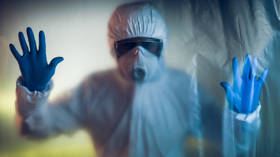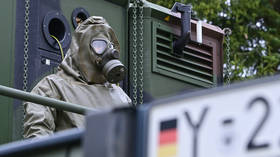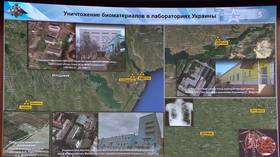Ukraine targetted children with TB plot – Russia

Moscow has claimed that Ukraine tried to infect the population of the Russia-aligned Lugansk People’s Republic with tuberculosis (TB) and allowed the US government to carry out human experiments at Kharkov’s psychiatric wards.
During a briefing on the findings of the Russian Defense Ministry’s investigation into the purportedly US-funded bioweapon labs in Ukraine, Chief of Russia’s Radioactive, Chemical, and Biological Protection Forces Lieutenant General Igor Kirillov claimed that Russian forces had obtained evidence suggesting Kiev attempted to infect residents of the Slavyanoserbsk district of the Lugansk People’s Republic (LPR) with a highly pathogenic strain of tuberculosis in 2020.
“Leaflets made in the form of counterfeit banknotes were infected with the causative agent of tuberculosis and distributed among minors in the village of Stepovoe,” Kirillov said, adding that the organizers of this crime took into account the behavior of children, which includes “putting things in their mouth” and handling food without washing their hands.
Kirillov stated that the results of the bacteriological studies confirmed the resistance of the isolated bacteria found on the leaflets to first and second line anti-TB drugs, which meant that the disease caused by them was much more difficult and expensive to treat.
He went on to quote the conclusion of the Lugansk Republican Sanitary and Epidemiological station, which stated that “the infection of the banknotes was most likely artificial, since the material contains extremely dangerous strains of the pathogen in a concentration that can ensure infection and the development of the tuberculosis process.”
Kirillov added that the LPR TB dispensary also noted signs of “deliberate, man-made contamination of leaflets with biomaterials of high pathogenicity.”
Russian officials also claimed that the Pentagon had been allegedly conducting “inhumane” experiments on the patients of at least two psychiatric institutions in Kharkov. “The main category of experimental subjects was a group of male, highly physically exhausted patients aged between 40 to 60 years,” Kirillov said.
The experiments were run directly by foreign specialists that had arrived in Ukraine through third-party nations to conceal the US’ involvement. The specialists were abruptly evacuated from the country earlier this year, shortly before the Russian military operation kicked off, Kirillov noted.
“In January 2022, the foreign citizens who conducted the experiments were urgently evacuated, and the equipment and drugs they used were taken to the western regions of Ukraine,” he said.
Last week, the head of Russia’s Investigative Committee, Alexander Bastrykin, told RT that the service had “clearly identified” multiple Americans involved in the military biological research in Ukraine, including Pentagon employees, as well as companies closely associated with the US military. According to Russian estimates, Washington poured more than $224 million into biological research in the country between 2005 and early 2022, Bastrykin stated.
US officials have confirmed the existence of “biological research facilities” in Ukraine, but said Washington only provided what they called “assistance” for efforts that did not involve the development of bioweapons.
Russia attacked the neighboring state in late February, following Ukraine’s failure to implement the terms of the Minsk agreements, first signed in 2014, and Moscow’s eventual recognition of the Donbass republics of Donetsk and Lugansk. The German- and French-brokered protocols were designed to give the breakaway regions special status within the Ukrainian state.
The Kremlin has since demanded that Ukraine officially declare itself a neutral country that will never join the US-led NATO military bloc. Kiev insists the Russian offensive was completely unprovoked and has denied claims it was planning to retake the two republics by force.















